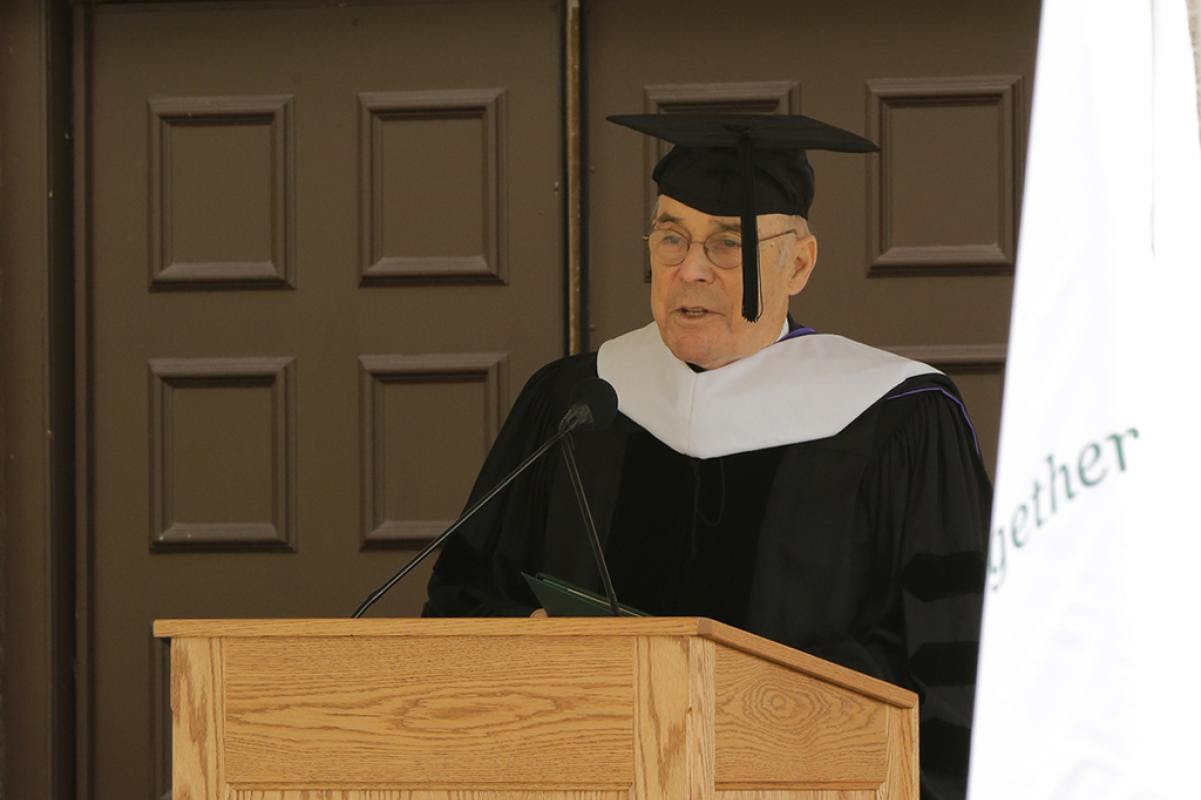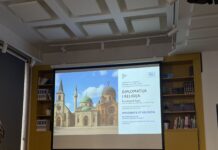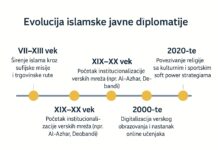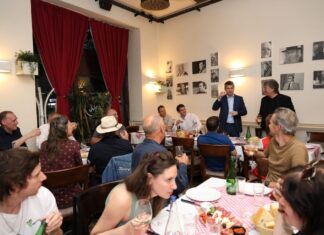Keuka College: Commencement speaker and retired ambassador Robert Gosende offered a global perspective during Keuka College’s 111th Commencement. (Photo: Rachel E. Dewey)
– Madame President– Mr. Board Chairman– Distinguished other Board Members, especially Rev. Dr. Marlowe V.N. Washington,– Distinguished and talented Faculty here at Keuka College,– And most important of all today: graduating members of the Class of 2019:-It is my great honor to be with you today. You have bestowed on me the greatest honor of my life by inviting me to speak to you on the 56th anniversary of the rev. Martin Luther King’s appearance here in 1963. I am daunted and humbled and very nervous as I attempt to meet this challenge and uphold your high standards. I hope that you will find my remarks useful.
I am embarrassed that my generation is leaving you with so much to do to set our country back on a more civilized course. That is certainly not what we intended. My remarks are made from the perspective of our service abroad. My wife and I spent 36 years in the Diplomatic Service of our country in Uganda, Libya, Somalia, South Africa, Poland and the Russian Federation. Also, that outside world is certainly important for you now because we live in an ever-more interconnected world which presents both challenges and immense opportunities for the future no matter what your eventual work turns out to be.
Today I will focus on four subjects to try to provide you with my counsel on how you might address them: First: I will deal with International Relations/Foreign Policy, Second: I will speak about how we might try to be active in preventing another holocaust or mass murder, Third: I cannot resist introducing you to one of my favorite scholars, Professor Larry Sabato and talk to you about his counsel on how we might try to make changes in our Constitutional order that might help us deal with our currently disordered body politic.
And finally I will speak about the recent work of our country’s most senior retired diplomat, Ambassador William J. Burns.
I will leave you this morning with the necessary links for you to get further information on these four issues. It is my hope that this will help you to navigate the world on your own after completion of your Keuka College degrees.
On dealing with International Relations and Foreign Policy: the American Foreign Policy Association:
The American Foreign Policy Association was founded just over 100 years ago, in 1918, in the aftermath of World War One. The foremost thought on the minds of its creators was that everything possible should be done to avoid the recurrence of another World War. Obviously, FPA was not able to attain that goal but it is important to have a look at what FPA has accomplished over the years and what it does now. FPA is a non-profit organization with the fundamental goal of spreading global awareness and understanding of foreign policy issues to the American public. It does not focus its efforts on the elites of our foreign policy establishment. Rather it seeks to address high school and university students and the general public.
It is important to remember that FPA was founded just before the 19th Amendment to our Constitution was ratified which finally granted women the right to vote. And it is even more important to note the prominent leadership role that women played in the Foreign Policy Association from the beginning. This was a time when women in our country were no longer prepared to play only a background role in how our country was governed.
In the 1920’s FPA initiated Saturday foreign policy discussions in New York City which quickly grew popular. In 1938, 19 pioneering FPA women established FPA’s “Off the Record” lecture series which went onto the airwaves when Vera Micheles Dean first produced “The World Today” which was broadcast by the NBC Radio Network. This program was our country’s first use of the airwaves to promote the discussion of American foreign policy to the general public. As discussions on foreign policy among citizens spread across the country, FPA branches became the forerunners of what is now a network over 100 World Affairs Councils across our country.
Today the heart of FPA’s efforts to reach the general public and high school and university students is the annual Great Decisions Program Briefing in Book which is now the largest non-partisan public education program on international affairs in the world. Each year since the 1970’s FPA has sponsored national opinion ballots through which participating Americans are able to identify the eight most important international affairs challenges currently confronting our nation. Once the issues have been identified, FPA commissions analyses written by experts with each article offering policy options for U.S. officials as well as questions and tools for discussion. The Editor for Great Decisions is Karen Rohan who completed her undergraduate work at Smith College and her Masters at Columbia University’s famed School of International and Public Affairs. Karen carries on the long tradition of women playing leading roles in foreign affairs at FPA.
What this means for you is that for the munificent sum of $32.00 you can purchase the annual Great Decisions Briefing Book for you private reading pleasure and/or you can establish within your community an annual Great Decisions discussion group meeting which will meet eight times annually to talk through each of the current year’s Great Decisions topics. You may want to enlist the assistance of a local expert on each subject to help guide your discussions. FPA will provide the Briefing Book as well as bibliographies on each subject. FPA also produces annually the Great Decision Television Seriesbroadcast on public television.
This Great Decisions topics for 2019 are:- Refugees and Global Migration- The Middle east: Regional Disorder- Nuclear Negotiations: Back to the Future?- The Rise of Populism in Europe- Decoding U.S. – China trade- Cyber Conflict and geopolitics- The United States and Mexico: Partnership tested- The state of the state Department and Diplomacy
Over the years FPA has repeatedly been commended by U.S. Presidents for its Great Decisions Program. FPA sends the results of its annual opinion surveys to the White House, the Departments of State and Defense, Congress and our Nation’s media. The preparation of innovative study materials and teachers’ guides, as well as workshops for teachers, are among top FPA priorities.
Most important to note here is that the Foreign Policy Association is our country’s sole national non-profit, non-partisan organization dedicated to reaching out to the general public in our country on foreign policy challenges we confront. It does not seek to influence Henry Kissinger. It seeks to address the general public.
Second: Preventing another holocaust or mass murder: Some 20 years ago the Center for Justice and Accountability was founded in San Francisco. CJA was founded on the principle first used after World War II that certain crimes are so egregious that they represent offenses against all humankind. Such crimes include genocide, crimes against humanity, extra-judicial killings and torture. CJA’s vision is a world in which justice thrives – where every nation has the capacity and willingness to prosecute human rights criminals and achieve justice for those most marginalized in society. CJA seeks to prosecute those cases that help all of us to bring meaning to the oft-ignored admonition: “never again.”
CJA operates on a bare bones annual budget of some $4 million. It depends overwhelmingly on pro-bono cooperation and support from private citizens and law firms across our country. These pro-bono efforts provide the backbone for CJA’s prosecutions. CJA’s first case, filed in 1998, brought to justice a Bosnian war criminal who had found safe haven here in the U.S. It successfully defended that Mayan Ixil community from Guatemala in cases both in Spain and here in the U.S. seeking accountability for a genocide that killed thousands of people. CJA represented Cambodian Americans against the Khmer Rouge regime which had led to the deaths of perhaps as many as 3 million people.
I have just come from participating in a CJA case which brought to task a Somali war criminal in the U.S. Federal District Court in Alexandria, VA. This person served as a senior Somali Army Commander in The dictatorship of General Mohammed Siad Barre. He was accused of the attempted murder of a member of the Isaak clan in northern Somalia against whom the Siad Barre regime was perpetrating genocide. It has taken over 20 years to bring this man to justice with his case going all the way to our Supreme Court before his trial finally began this past week.
My third item today is possible changes in our Constitutional order:
I am suggesting that you become familiar with the work of one of our country’s foremost political scientists and political analysts, Professor Larry Sabato of the University of Virginia at Charlottesville. Prof. Sabato is the University’s Robert Kent Gooch Professor of Politics and founder and director of The University’s Center for Politics which works to promote civic engagement and participation. The Center is also responsible for the publication of Sabato’s Crystal Ball, an online newsletter and website that provides free political analysis and electoral projections.
Prof. Sabato’s most recent publication is a book entitled “A More Perfect Constitution.”This new work is remarkable in that it shows how capable Prof. Sabato is at being able to “think outside of the box” now as we address the obvious disfunction on our body politic. It is altogether too easy to throw up one’s hands in despair as to what to do but Prof. Sabato very calmly uses our law and traditions to make suggestions that we might consider. I offer the following of Prof. Sabato’s suggestions for your consideration this morning:
On the Congress:- Expand the senate to 136 members to be more representative: Grant the 10 most populous states two additional Senators, the next 15 most populous states one additional Senator and the District of Columbia one senator.- Appoint all former Presidents and Vice Presidents to the new office of National senator.- Mandate non-partisan redistricting for House elections to enhance electoral competition.- Lengthen House terms to three years, (from two) and set Senate terms to coincide with all
Presidential elections, so the entire House and Senate would be elected at the same time as the President.- Expand the size of the House to approximately 1000 members (from the current 435) so House members can be closer to their constituents, and to level the playing field in House elections.- Establish terms limits in the House and the Senate to restore the founder’s principle of frequent rotation in office.- Add a balanced Budget Amendment to encourage fiscal fairness to future generations
On the Presidency:- Establish a new six-year, one -time Presidential term with the option for the President to seek two years additional years in an up/down referendum by the American people.
– Limit some Presidential war-making powers and expand Congress’s oversight of war-making.- Give the President a line-item veto.- Allow men and women not born in the U.S. to run for President or Vice President after having been a citizen for 20 years.
On the Supreme Court:- Eliminate lifetime tenure for federal judges in favor of non-renewable 15th year terms for all federal judges.
– Grant Congress the power to set a mandatory retirement age for all federal judges.- Expand the size of the Supreme Court from 9 to 12 to be more representative.- Give federal judges guaranteed cost of living increases so pay is never an issue.
On Politics:- Mend the electoral College by granting more populated states additional electors, to preserve the benefits of the College while minimizing the chances a President will win without a majority of the popular vote.- Reform campaign financing by preventing wealthy candidates from financing their campaigns, and by mandating partial public financing for House and Senate campaigns.- Establish an automatic registration system for all qualified American citizens to guarantee their right to vote is not abridged by bureaucratic requirements.
Universal National Service:- Create a Constitutional requirement that all able-bodied young Americans devote at least two year of their lives in service to the country.
National Constitutional Convention: – Convene a new Constitutional Convention using the state-based mechanism left to us by the Framers in the current Constitution.
I do not agree with all of Prof. Sabato’s proposals (especially the balanced budget amendment since there are times when we must break the balance to deal with emergencies) but he certainly gives us food for thought now.
For my fourth item today I want to tell you a bit about the most recent work of our country’s most senior retired diplomat, Ambassador William J. Burns. Bill Burns rose in our Foreign Service to become Deputy Secretary of state. He was the second career officer ever to hold that position. He retired at the rank of Career Ambassador which is the military equivalent of four star general. Ambassador Burns now serves as the President of the Carnegie Endowment for International Peace.
Ambassador Burns’ most recent book, entitled The Back Channel, which I commend to your most urgent reading list, has generated great interest now because he is speaking about the policies of our current Presidential Administration. He is puzzled by its willingness to tear apart relations between our country and our most important allies in Europe, for example, while undertaking policies that isolate us from other important parts of the world. He believes that it has been, to quote him directly, “an historic mistake to abandon the Joint Comprehensive Plan of Action with Iran after having spent years corralling an international coalition while building economic and political leverage working with international partners. By this unfortunate decision we end up isolating ourselves instead of isolating the Iranians. In effect we are doing Vladimir Putin’s work for him.”
Ambassador Burns is concerned that in under the current administration diplomacy has taken a back seat while other actors, particularly the Department of Defense, have come to the fore. He believes that the Department of State has the experience necessary in international affairs to be the overall conductor as we approach the world beyond our borders.
As I said in the beginning, I believe that you have been left altogether too much to do now to get our country back on track. The fact that our national leadership has abandoned diplomacy as a tool as we seek our way through today’s difficult world is most certainly unfortunate. But our system is strong but people need to understand how it is supposed to function and they have to participate. I began my professional life as a high school history, geography, and civics teacher in Massachusetts. To receive a high school diploma in Massachusetts all those years ago one had to pass two years of U.S History, one year of World Geography and one year of Civics. But we unfortunately began to move away from theserequirements to focus or on STEM: Science, Technology, Engineering, and Math. And now we seem to be producing talented people in these fields but people who do not understand how our system of government is supposed to work.
We need to correct this! As Keuka College graduates you have become very qualified to do so!
Thanks for your time and attention.
Links/Contact information:
The American Foreign Policy Association: www.fpa.orgThe Center for Justice and accountability: www.cja.orgProfessor Larry Sabato, Director, University of Virginia Center for Politics: www.centerforpolitics.orgAmbassador William J. Burns, President, Carnegie International Endowment for International Peace:www.carnegieendowment.org
JB: Note: Any errors in this transcription are my own.
**1.Event/illustrations/Gosende bio
Sun Shines on Keuka College Class of 2019 at 111th Commencement, keuka.edu
 Image from article, with caption: Keuka College Class of 2019 graduates, from left, Jim Truong, Megan Weber, Mary Mullen, McKayla Nolan, and Vanessa Tsarevich celebrate the big day. (Photo: Gretchen Parsells)
Image from article, with caption: Keuka College Class of 2019 graduates, from left, Jim Truong, Megan Weber, Mary Mullen, McKayla Nolan, and Vanessa Tsarevich celebrate the big day. (Photo: Gretchen Parsells)
With newly minted graduates, a newly installed president, and a sun-filled sky that was, if not new, at least novel in recent weeks, Keuka College’s Class of 2019 whooped, hollered, and crossed the stage during Saturday’s 111th Commencement celebration.
Retired American Ambassador Robert R. Gosende encouraged the approximately 460 graduates to be global thinkers who also work for the greater good at home during his Commencement address.
“The fact that our national leadership has abandoned diplomacy as a tool as we seek our way through today’s difficult world is most certainly unfortunate,” said Mr. Gosende, who served for 36 years in Foreign Service with the U.S. Information Agency and the Department of State before joining the State University of New York in 1998. “Our system is strong but people need to understand how it is supposed to function and how they have to participate.”
Mr. Gosende, whose diplomatic assignments included tours of duty in Libya, Somalia, Poland, South Africa, and the Russian Federation, told graduates they would need to make up for their predecessors’ shortcomings on the global stage.
“I’m embarrassed that my generation is leaving you with so much to do to set our country back on a more civilized course,” he said. “That is certainly not what we intended.”
He focused on four key areas: foreign policy, preventing future instances of genocide, the work of retired Foreign Service Officer William J. Burns, and changes to the U.S. political system proposed by Professor Larry Sabato of the University of Virginia at Charlottesville.
Among the latter: Mandating non-partisan redistricting for House elections, establishing a single six-year term for presidents with the option of an additional two years through a public referendum, and eliminating lifetime tenure for federal judges.
Mr. Gosende also lamented the decline of high school instruction in civics, history, and world geography.
“We unfortunately began to move away from these requirements to focus on STEM: Science, Technology, Engineering, and Math,” he said.“And now we seem to be producing talented people in these fields, but people who do not understand how our system of government issupposed to work. We need to correct this! As Keuka College graduates, you have become uniquely qualified to make those corrections.”
Upon the completion of his address, Mr. Gosende was presented with an honorary Doctor of Humane Letters degree by College President Amy Storey.
Presiding over her first Commencement following her appointment by the Board of Trustees earlier this week, President Storey urged graduates to put the tools they’ve honed on campus to good use.
“I know that you are smarter, stronger, and kinder today than you were when you arrived at Keuka College,” she said. “Use that growth to your advantage. You are in control of your destiny. Use your smarts, your strengths, and your kindness every day to enrich your life and the lives of those around you.”
Also taking place during Commencement ceremonies:
– An Award of Higher Education was presented to Joseph Alessi and Joshua Burnett, two students from the DRIVE (Diversity, Respect, Inclusion, Vision and Experiential Learning) program. D.R.I.V.E. is a collaboration of the Dundee Central School District, the ARC of Yates, and Keuka College in which College students serve as peer mentors to young adults with intellectual disabilities as they assimilate into the College environment and explore their personal goals.
– Jennifer Mealey, associate professor of social work, was named Professor of the Year. Prof. Mealey was praised for her teaching excellence, her engagement in the classroom, and her dedication to Keuka College.
-Catherine Reed, writing specialist and instructor of English, was named Adjunct Instructor of the Year.
-The Keuka College Board of Trustees awarded the status of Professor Emerita to Dr. Kasey Klingensmith, professor of biology, and to Ann Tuttle, chair of the Division of Business and Management and professor of management.
-Registrar Jill Bird was named Staff Member of the Year.
– Spehttps://www.keuka.edu/news/veteran-ambassador-deliver-keuka-college-commencement-addresseeches were delivered by student representatives Mack Ottens ’19 and JoAnn Gillette ’17 M’19.
2.
Veteran ambassador to deliver Keuka College Commencement Address, keuka.edu.
Ambassador Robert R. Gosende, shown speaking at a Sienna College symposium last year, will deliver the 111th Commencement address at Keuka College this spring. (Photo courtesy Sienna College)
 Gosende image from article
Gosende image from article
A veteran diplomat who represented U.S. interests during some of the most heated international crises of the past generation will deliver the keynote address at Keuka College’s 111th Commencement ceremonies on May 18.
Ambassador Robert R. Gosende served for 36 years in Foreign Service with the U.S. Information Agency and the Department of State before joining the State University of New York in 1998. His diplomatic assignments included tours of duty as a Cultural Affairs Officer in Libya, Somalia, and Poland, and as Minister-Counselor for Public Affairs in South Africa and in the Russian Federation.
Ambassador Gosende served as President Clinton’s Special Envoy for Somalia at the height of the security and humanitarian crisis in that country from 1992-93. In 1994, he was Senior Advisor to the Assistant Secretary of State for African Affairs, directing the U.S. Government’s education and public affairs activities in support of the first multi-racial elections held in South Africa in April of that year.
While stationed in Washington, D.C., Ambassador Gosende served as the Associate Director of the Bureau of Educational and Cultural Affairs of the U.S. Information Agency, and as that Agency’s Deputy Director and Director for Sub-Saharan African Affairs.
Ambassador Gosende said he will focus, in his speech, on current political challenges and look to make the case for why we need greater understanding of our country’s role in the world.
“I am an optimist and I believe deeply that our system has built-in means for correction,” he said from his home in Guilderland, N.Y. “Our system will correct itself but it will take some time and, in the meantime, there may well have been some things done that most Americans do not agree with. If that is the case there will have to be ways found to correct the things that the majority of voters think need to be corrected.”
This year’s commencement begins at 10 a.m. on Saturday, May 18, outside the College’s Norton Chapel on the Keuka Park campus.
Original Article
[Commencement Address by Ambassador Robert Gosende, Practitioner of Public Diplomacy par excellence]
Views: 15













